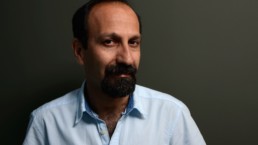‘The Salesman’ Director Asghar Farhadi on Rushing Childhood and Past Regrets
This is a custom heading element.
I meet Iranian director Asghar Farhadi at the Cohen Media Group’s conference center, located in the Pacific Design Center in West Hollywood, last week. Our previously scheduled interview had been delayed due to visa issues, but the timing couldn’t have worked out better. His latest feature film, “The Salesman,” had just been nominated for a Golden Globe and is now Iran’s submission for Best Foreign Language film at the Academy Awards. Farhadi, who is not fluent in English, sits next to his translator as we begin the interview and from the very moment he speaks, he seems to transcend language altogether and tap into a higher consciousness. His wisdom and enlightenment are not solely focused on film, Farhadi also shares his thoughts on the loneliness despite modern-day technology, the connection he has to Death of a Salesman, and his personal regret of rushing his own childhood. We begin:
Where did you get the idea for this film?
For many years, I’ve had the idea of a couple who would rent [an apartment] whose previous tenant was a prostitute. But the story was never complete enough for me to decide to make it, until one day, I came to the realization of what it was [the couple] did in life; I thought if they were theater actors, it would help me a great dealt to help me find the part that was missing in my story. For them to be actors, what that means is they are individuals who know how to put themselves in the shoes of another and to have empathy… but in reality, how well do they succeed in putting themselves in another’s shoes?
A major theme in the film is dealing with guilt, which then turns into feelings of revenge. How do you describe the revenge in the film?
We need to look at what revenge means. When someone does us harm and we pronounce judgment, and sentence, and execute that sentence against that person, this is what we call revenge.
Women, as a whole, tend to be forgiving than men. In my previous film, “The Past,” I also point to this. Because women are capable of child-bearing, their gaze is pointed toward the future more. Men, perhaps because they worked the land, are more rooted to where they are and are looking [at the past] more. In “The Salesman,” the woman is saying I am the one who has undergone harm and she wants to have a part in the judgment against the old man.
Another point that is significant is that a man has intruded on the couple’s private space and attacked their honor. She’s upset that her husband now wishes to act in the same way toward [the old man]. She doesn’t want to force her husband to forgive the old man, but she says the way he’s going about it is action that is not moral.
Can she achieve closure?
This is something that will remain with her life a lifelong wound. But she, at the same time, appears to have the capacity to understand the situation.
“I’m now coming to discover that cinema is not the most important thing in the world. Childhood and living are much more important things.”

What was the first job you ever had, and if it wasn’t film-related, when was the moment you knew you wanted to get into filmmaking?
I had no time to have another job, I was 13 when I made my first film and then made a short film each year [after]. The I quickly went on to University where I studied theater. Now, I regret it. I entered cinema too early. I started to ponder these serious questions too soon. I feel like my childhood was diminished. I wish I could go back and start these things a little later. I’m now coming to discover that cinema is not the most important thing in the world. Childhood and living are much more important things.
From “A Separation” to this film, this theme of communication feels very strong.
It is very important to me. In today’s world, where language, the networks for communication have all expanded so much, it seems to me that we have so much more tools and devices for communicating. Why, then, are we so alone? And those who are not alone, are pretending not to be alone. People have become very alone. It seems to me, the more progress we make and the more we expand the language, the less we are communicating.
Relative to the past, humans have become more complicated. Like an object that has hundreds of facets, another individual would be the same. For these two to meet, to be joined, there’s a very limited surface where they can meet. I’m not trying to say that the modern world is a bad world– it’s a much more comfortable world– but misunderstandings are much more frequent in it than in the “old world.”
“He thinks even if he’s gone and dead, it’s going to be ok– this family is going to carry on the same. Truly, when I think about this, I want to cry.”

What was the significance of Death of a Salesman in the film?
It’s a very well-loved play in my country. I like that play a great deal for a number of reasons. In the play, Arthur Miller empathizes with all of his main characters. It’s not easy to say whether it’s Willy Lohman or his son that’s responsible for the crisis. A significant theme in that play is humiliation. Willy Lohman commits suicide because his son, co-workers, and neighbors, humiliate him. The tragedy of that play is that that individual feels completely useless in his family; he feels like he is nobody.
Do you know why Willy Lohman’s job is traveling to different towns? When he goes away, no one feels he’s gone in that house. He thinks even if he’s gone and dead, it’s going to be ok– this family is going to carry on the same. Truly, when I think about this, I want to cry. It’s the most difficult situation for a father to be in. In my film, that old man is the Iranian Willy Lohman. Maybe it’s what he’s missing that caused him to establish a relationship with the prostitute.
In Death of a Salesman, the series of events is caused by the demolition of a building which sends the protagonist on a downward spiral. It also ends there. What significance does that have on “The Salesman?”
I see it as a prologue, a sort of foreshadowing of the way in which the relationships between people are undermined at the foundation– as if the more the film advances, the greater the cracks in the relationship become apparent.
“The Salesman” opens in theaters Friday, January 27th.
Morgan Rojas
Certified fresh. For disclosure purposes, Morgan currently runs PR at PRETTYBIRD and Ventureland.


